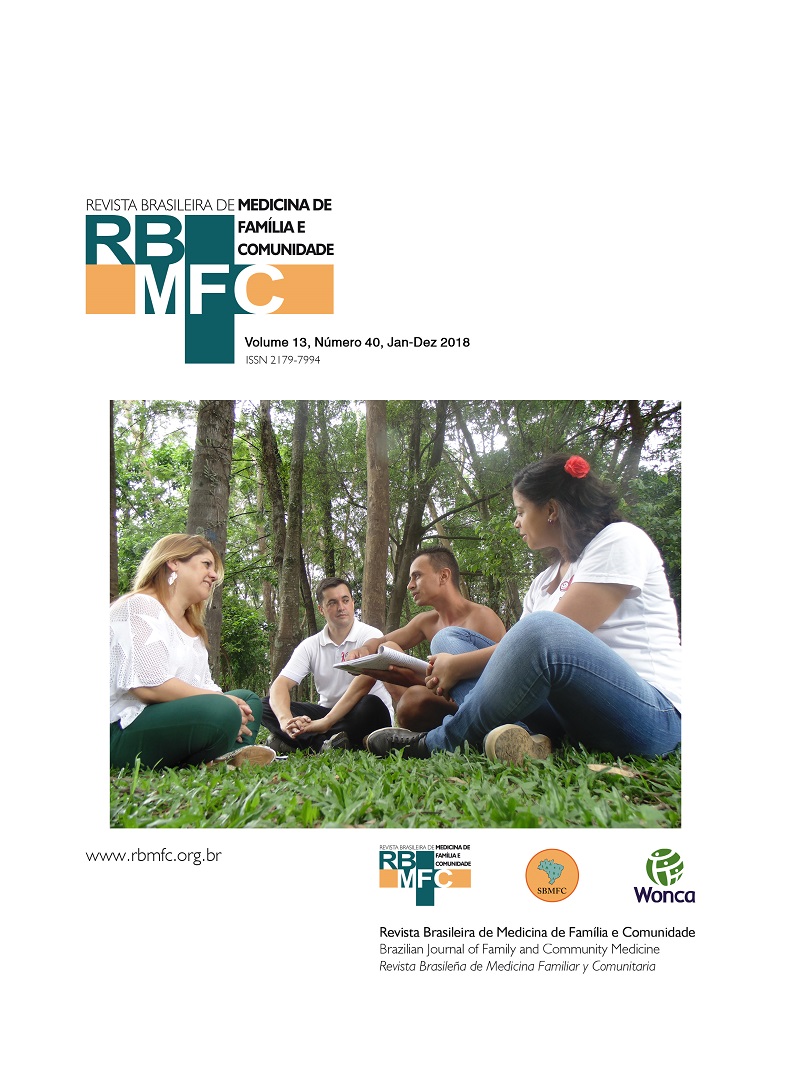The Competency-based Curriculum of the Residency Program in Family Medicine at Faculdade de Medicina da Universidade de São Paulo
DOI:
https://doi.org/10.5712/rbmfc13(40)1602Keywords:
Competency-Based Education, Internship and Residency, Family PracticeAbstract
Objective: To present the steps taken to build a competency curriculum in family medicine residency program of the within the Medical School of the University of São Paulo; to describe fundamental characteristics and guidelines of the competency curriculum related to its three central attributes: learning tools, teaching methodologies and evaluation processes; and finally, to describe comparisons of the use of evaluation instruments by our residency program and other experiences in the literature. Methods: Review and analysis of the main international experiences in training of family physicians; conducting a series of workshops and creation of working groups with specific areas, themes and responsibilities for study, presentation and collective definition. Results: Elaboration of a competency curriculum based on a five-dimensional competence model. Conclusion: Establishing a competency-based curriculum is vital to in the organization of the residency program. The use of international and national references and the contribution of the people involved in the residence program favor the organization of competences while respecting the singularities of the residency program. Challenges are encountered in implementing the curriculum in the practice of the day.
Downloads
Metrics
References
Starfield B. Family medicine should shape reform, not vice versa. Fam Pract Manag. 2009;16(4):6-7.
McWhinney IR. William Pickles Lecture 1996. The importance of being different. Br J Gen Pract. 1996;46(408):433-6.
Freeman TR. Manual de Medicina de Família e Comunidade de McWhinney. 4ª ed. Porto Alegre: Artmed; 2018. 536 p.
Royal College of General Practitioners Curriculum 2010 (RCGP). Being a General Practitioner. 2012 [cited 2017 Aug 30]; Available from: http://www.gmc-uk.org/RCGP_Curriculum_1_Being_a_GP.pdf_49504415.pdf
Coordenação Internato Médico Medicina Geral Familiar Zona Norte (CIMGFZN). Portfolio do Interno - Internato Médico de Medicina Geral e Familiar [Internet]. Porto; 2011 [cited 2017 Aug 30]. Available from: http://portal.arsnorte.min-saude.pt/portal/page/portal/ARSNorte/Internatos/Medicina Geral e Familiar/Ficheiros/Manuais de Formação/Portfolio_Jan2011.pdf
Comisión Nacional de la Especialidad de Medicina Familiar y Comunitaria, Ministerio de Sanidad y Consumo, Ministerio de Educación y Ciencia. Programa Formativo de la Especialidad de Medicina Familiar Y Comunitaria [Internet]. Madrid; 2005 [cited 2017 Aug 30]. Available from: http://www.msc.es/profesionales/formacion/docs/medifamiliar.pdf
Parry SB. The Quest for competencies. Training. 1996;33(7):54-6.
Valladão Jr J, Gusso G, Olmos R, editors. Parte 3: Manual de competências. In: Manual do Médico Residente de Medicina de Família e Comunidade da Faculdade de Medicina da Universidade de São Paulo (USP). 1ª ed. São Paulo: Atheneu; 2017. p. 435-614. DOI: https://doi.org/10.5712/rbmfc13(40)1602
Borges MC, Miranda CH, Santana RC, Bollela VR. Avaliação formativa e feedback como ferramenta de aprendizado na formação de profissionais da saúde. Medicina (Ribeirão Preto). 2014;47(3):324-31. DOI: http://dx.doi.org/10.11606/issn.2176-7262.v47i3p324-331 DOI: https://doi.org/10.11606/issn.2176-7262.v47i3p324-331
Flum E, Maagaard R, Godycki-Cwirko M, Scarborough N, Scherpbier N, Ledig T, et al. Assessing family medicine trainees--what can we learn from the European neighbours? GMS Z Med Ausbild. 2015;32(2):Doc21.
Vicentim E, Valladão Jr J. Ferramentas de Avaliação. In: Valladão Jr J, Gusso G, Olmos R, eds. Manual do Médico Residente de Medicina de Família e Comunidade da Faculdade de Medicina da Universidade de São Paulo (USP). São Paulo: Atheneu; 2017. p. 615-33.
Ross S, Poth CN, Donoff M, Humphries P, Steiner I, Schipper S, et al. Competency-based achievement system: using formative feedback to teach and assess family medicine residents’ skills. Can Fam Physician. 2011;57(9):e323-30.
Consultation Observation Tool (COT) for MRCGP Workplace Based Assessment. [Internet]. [cited 2017 Aug 29]. Available from: http://www.rcgp.org.uk/training-exams/training/mrcgp-workplace-based-assessment-wpba/cot-for-mrcgp-workplace-based-assessment.aspx
WPBA competences [Internet]. [cited 2017 Aug 29]. Available from: http://www.rcgp.org.uk/training-exams/mrcgp-workplace-based-assessment-wpba/wpba-competence-framework.aspx
Verby JE, Holden P, Davis RH. Peer review of consultations in primary care: the use of audiovisual recordings. Br Med J. 1979;1(6179):1686-8. DOI: http://dx.doi.org/10.1136/bmj.1.6179.1686 DOI: https://doi.org/10.1136/bmj.1.6179.1686
Lesser AL. Problem-based interviewing in general practice: a model. Med Educ. 1985;19(4):299-304. DOI: http://dx.doi.org/10.1111/j.1365-2923.1985.tb01325.x DOI: https://doi.org/10.1111/j.1365-2923.1985.tb01325.x
Silverman J, Kurtz S, Draper J. Skills for Communicating with Patients. 3rd ed. London: CRC Press; 2016. 317 p. DOI: https://doi.org/10.1201/9781910227268
Ramos V. A consulta em 7 passos - Execução e análise crítica de consultas em medicina geral e familiar [Internet]. Lisboa; 2008 [cited 2017 Aug 29]. Available from: http://www.apmgf.pt/ficheiros/A Consulta 7 passos.pdf DOI: https://doi.org/10.32385/rpmgf.v25i2.10609
Moral RR, Rodriguez Salvador JJ, de Torres LP, Prados Castillejo JA; COMCORD Research Group. Effectiveness of a clinical interviewing training program for family practice residents: a randomized controlled trial. Fam Med. Fam Med. 2003;35(7):489-95.
Nilsen S, Baerheim A. Feedback on video recorded consultations in medical teaching: why students loathe and love it - a focus-group based qualitative study. BMC Med Educ. 2005;5:28. DOI: http://dx.doi.org/10.1186/1472-6920-5-28 DOI: https://doi.org/10.1186/1472-6920-5-28
Eeckhout T, Gerits M, Bouquillon D, Schoenmakers B. Video training with peer feedback in real-time consultation: acceptability and feasibility in a general-practice setting. Postgrad Med J. 2016;92(1090):431-5. DOI: http://dx.doi.org/10.1136/postgradmedj-
-133633
Downloads
Published
How to Cite
Issue
Section
License
By submitting a manuscript to the RBMFC, authors retain ownership of the copyright in the article, and authorize RBMFC to publish that manuscript under the Creative Commons Attribution 4.0 license and identify itself as the vehicle of its original publication.















